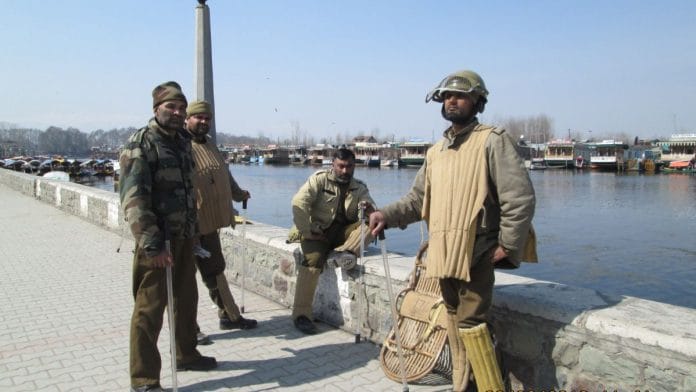New Delhi: Convinced by his mother to assist the police, a 15-year-old boy, radicalised into joining the terrorist group Tehreek Labaik Ya Muslim (TLM), blew the lid over a recruitment module operating from Pakistan, leading to the arrest of seven people, ThePrint has learnt.
It was later found that 14 boys had been recruited by the module, radicalised, and given online training in shooting and were to be used by the banned Lashkar-e-Taiba (LeT) for targeted attacks to spread terror—a plan that was ultimately foiled. The guardians and parents of the juveniles were called, counselled and then released, while the seven people were detained.
The TLM is a newly floated offshoot of the Pakistan-based Lashkar-e-Taiba.
According to sources in the police, the juveniles—all in the age group of 14 to 17—were in touch with their handler over encrypted applications like BiP messenger, Zangi and NordVPN.
Jammu and Kashmir Police’s Counter Intelligence Kashmir (CIK) unit had busted the aforementioned militant recruitment module last week, just two days after seven people were killed in a terror attack at a key tunnel construction site in Ganderbal. In CCTV footage, the attackers were seen entering the workers’ camp with an American M4 carbine and an AK-47.
Also Read: Symbol of hope for youth to now a ‘seasoned, no-nonsense politician’, the evolution of Omar Abdullah
‘A team was tracking encrypted apps’
According to a source in the Jammu and Kashmir Police, a team was tracking the new applications being used by the Pakistani handlers to recruit young Kashmiris, when it came across chats of Kashmiri juveniles with their handlers in Pakistan.
“The police managed to break the encryption of some of the applications and found that some Kashmiri boys were in touch with the same handler, who was sitting in Pakistan and giving instructions,” the source told ThePrint. “He was providing study material and posters, and sharing speeches and even videos to radicalise the boys.”
According to the source, training was also given to the boys via video calling.
“They are asked to buy a toy pistol and then practise firing. The handler tells them how to position their hand, keep it static and how to shoot. These kids are then used by these handlers to carry out attacks,” the source added.
14-year-old helped police crack apps
While going through the chats, the police identified a boy and tracked him down. He, along with his mother, was then called.
“He came with his mother. He was scared and reluctant but his mother convinced him to speak up. He then told us about the application, how he was contacted, and what handlers told him. He was counselled and sent back,” the above-mentioned source said.
Two days later, however, the boy returned with his mother and told the police that he would help them crack other applications as well, the source added.
“His mother convinced him to tell us whatever he knew and even assist us in the investigation. She told him that if he has to pick up a gun, he should become a cop and not a militant,” the source said.
“He asked for a phone and logged into the applications. Through those chats, we found that 13 more juveniles were in touch with those handlers who were giving several tasks.”
According to the source, the boys were being asked about the location of police deployment in specific areas. “All of them were traced and called, along with their parents.”
“While he was among the first few juveniles to be counselled, others too were counselled and then let off. Their parents or guardians were with them throughout. No one was detained or booked, but their details were noted down,” the source added. “The parents too told their children to be away from such apps or not to fall for such traps.”
The Tehreek Labaik Ya Muslim, the police said, has been involved in pasting posters at various locations in south and central Kashmir and its circulation on Internet-based social media platforms, which they did through new recruits.
(Edited by Radifah Kabir)
Also Read: Now revoked in J&K, what President’s Rule means legally & when it can be imposed, extended






